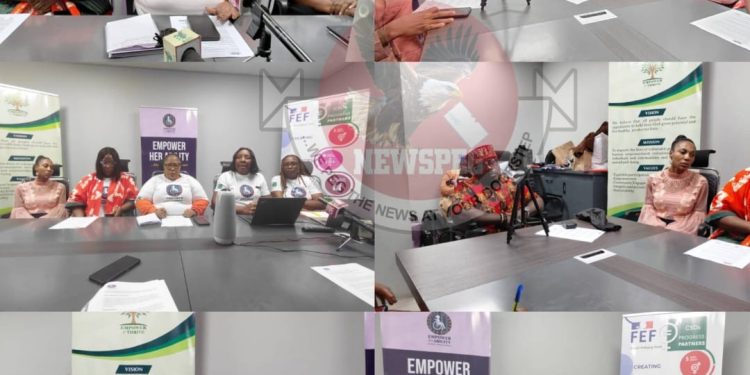By Nkechi Eze
A powerful new chapter for disability inclusion in Nigeria began with the official launch of the Empower Her Ability project in Abuja, a transformative initiative designed to revolutionize the socio-economic realities of women and girls with disabilities across the country. Spearheaded by the Empowered to Thrive Development Initiative, the project is being implemented in collaboration with the MimiJane Foundation for Women and Children with Disabilities, the Joint National Association of Persons with Disabilities (JUNAPWD), with generous support from the French Embassy in Nigeria under the French Embassy Fund for Civil Society Organisations (FEF-OSC).
The initiative, which targets young women with disabilities between the ages of 18 and 40, will directly support 25 selected beneficiaries through a rigorous 11-month accelerator programme. It also aims to indirectly impact more than 1,000 women and girls with disabilities across the country. The project is built around a holistic framework that combines entrepreneurship training, financial literacy, mentorship, policy advocacy, and increased access to funding and markets. More than just an intervention, the Empower Her Ability project is positioned as a national movement for visibility, dignity, inclusion, and sustainable empowerment of women with disabilities.
At the heart of the launch ceremony was a strong message of empowerment, not charity. The Executive Director of Empowered to Thrive Development Initiative, Dr. Ima Chima, delivered a passionate address, asserting that the project is not about handouts but about building systemic access and recognition for women with disabilities. “This project is about ensuring that women with disabilities have the tools, platforms, and opportunities they need to thrive, not just as entrepreneurs, but as leaders and agents of change in their communities,” Dr. Chima declared. She emphasized that the program would go beyond traditional training models, embedding within it a policy-focused agenda that pushes for long-term institutional reforms that guarantee the rights and dignity of persons with disabilities.
Dr. Chima noted that women with disabilities have been largely excluded from national economic discourse not because they lack competence or vision, but due to structural inequalities that continue to persist in society. “This project is designed to raise voices and create space for women with disabilities, recognizing their intelligence, leadership, and creative power,” she said, adding that, “we hope that this bold start will galvanize government at all levels to institutionalize inclusive policies that recognize the value of all citizens.”
Speaking in the same vein, Ambassador Mube Awala Beatrice, Executive Director of the MimiJane Foundation for Women and Children with Disabilities, called for more inclusive thinking in the design and execution of empowerment programmes. She stressed that accessibility must be a non-negotiable part of any initiative targeted at persons with disabilities. “We cannot talk about empowerment if the venues are not accessible, if the materials are not inclusive, or if the language is not respectful,” she said. She challenged stakeholders to build programmes around the passions, skills, and lived realities of the beneficiaries, rather than imposing government-defined solutions that often miss the mark. Ambassador Beatrice also urged the media to avoid stigmatising narratives and use inclusive, respectful language when reporting disability-related stories, noting that media framing plays a critical role in shaping both public perception and policy direction.
Representing the Joint National Association of Persons with Disabilities (JUNAPWD), Emmanuella Jighjigh conveyed the association’s full support for the project. She described the initiative as a much-needed intervention that reinforces JUNAPWD’s mandate to promote inclusion, dismantle barriers, and protect the rights of persons with disabilities across the country. “Empowering a woman with a disability is not just about lifting one person, it’s about transforming families, communities, and even national economies,” she remarked.
One of the most touching highlights of the event came from a beneficiary of the pilot phase of the project, known simply as “She Wins.” In an emotional testimony, she shared how the programme helped her move from uncertainty to clarity in her business journey. She credited the project for equipping her with tools to identify and solve business problems, develop a compelling value proposition, and implement a realistic growth strategy. Her testimony was met with applause as she expressed deep gratitude to the organizers for their tireless support, mentorship, and belief in the potential of women with disabilities.
As part of its commitment to accessibility, the Empower Her Ability project will ensure that all venues, learning materials, communications, and logistical arrangements are inclusive for women living with various forms of disability, be it mobility, visual, auditory, or cognitive. The project is intentionally community-driven, sustainability-focused, and rooted in the lived experiences of those it seeks to empower. Its holistic approach is aimed not only at building successful entrepreneurs but at cultivating leaders who can advocate for broader reforms in both public and private spheres.
As the event drew to a close, stakeholders, advocates, and guests were united in their conviction that Empower Her Ability is more than just a project, it is a rallying cry for justice, inclusion, and recognition. It is a movement that demands visibility for women who have been too often overlooked, amplifies their voices, and refuses to let physical limitations define potential.
With strong institutional partnerships, visionary leadership, and grassroots-driven action, the project has laid a solid foundation for a future where women with disabilities in Nigeria are seen first for their abilities, not their limitations. As the programme unfolds in the coming months, hopes remain high that the Empower Her Ability initiative will inspire national-scale reform, shape inclusive policies, and ultimately create a society where every woman, regardless of ability can rise, lead, and thrive.















